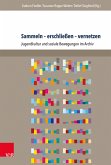The ferocity of the Nazi attack upon the Jews took many by surprise. Volkov argues that a new look at both the nature of antisemitism and at the complexity of modern Jewish life in Germany is required in order to provide an explanation. While antisemitism had a number of functions in pre-Nazi German society, it most particularly served as a cultural code, a sign of belonging to a particular political and cultural milieu. Surprisingly, it only had a limited effect on the lives of the Jews themselves. By the end of the nineteenth century, their integration was well advanced. Many of them enjoyed prosperity, prestige, and the pleasures of metropolitan life. This book stresses the dialectical nature of assimilation, the lead of the Jews in the processes of modernization, and, finally, their continuous efforts to 'invent' a modern Judaism that would fit their new social and cultural position.
Dieser Download kann aus rechtlichen Gründen nur mit Rechnungsadresse in A, B, BG, CY, CZ, D, DK, EW, E, FIN, F, GR, HR, H, IRL, I, LT, L, LR, M, NL, PL, P, R, S, SLO, SK ausgeliefert werden.









